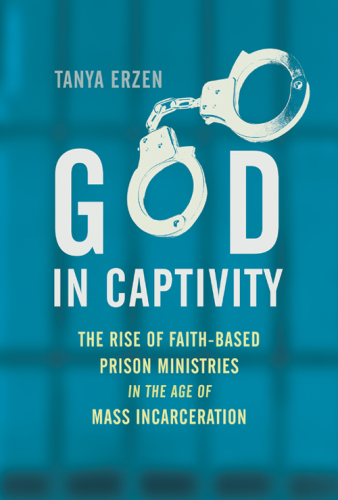
God in Captivity
The Rise of Faith-Based Prison Ministries in the Age of Mass Incarceration
کتاب های مرتبط
- اطلاعات
- نقد و بررسی
- دیدگاه کاربران
نقد و بررسی

Starred review from March 6, 2017
Religion scholar Erzen (Straight to Jesus) delivers another excellent, gripping ethnography, this time interviewing prisoners across the United States who are pursuing a university education while incarcerated. Weaving in historical exposition about prison systems, theories of punishment and rehabilitation, and the role of faith-based ministries, Erzen (who also teaches in a prison) paints a balanced portrait of the largely evangelical ministries that offer prisoners an education, exploring how these ministries transform and liberate certain individuals while using their monopoly of state prison systems to evangelize. Erzen’s research is impressive, wide-ranging, and thorough, and she is at her best when introducing readers to the women and men she interviewed: she provides in-depth portraits of their histories, explores their religious conversions, and shares the ways that getting a university education has changed their lives. Erzen is a talented writer whose prose is accessible and easy to digest, and she never dodges the complexities and rigor of her subject. This is an enlightening and unflinching examination of the tragedies of mass incarceration and the complicated role that faith-based ministries play in prisoner rehabilitation and the beliefs around it.

February 1, 2017
Erzen (Religion and Gender Studies/Univ. of Puget Sound; Fanpire: The Twilight Saga and the Women Who Love It, 2012, etc.) examines the rise of ministries in some of America's largest prison systems, critiquing their motives and effectiveness.The author's research is based mainly on such prisons as Texas' Darrington Unit and the Louisiana State Penitentiary, along with a smattering of other prisons in other states. Erzen focuses especially on Protestant Christian ministries, which evangelize prisoners with the goal of transforming them into ministers within the prison system itself. Though admitting at times that these ministries provide a certain level of meaning and self-esteem for prisoners serving lengthy sentences, on the whole, it seems the author sees these ministries as self-serving ways of controlling a bloated prison population. Ultimately, she argues, they continue a race-based view of retribution, punishment, and proper "place" in society, which goes back to antebellum days. Erzen also notes that faith-based prison ministries fail to rise above a simple focus on the prisoner at the expense of a larger view of the prison problem: "In focusing on individual conversion, many faith-based prison ministries neglect the broader issues of how people came to prison and end up fortifying the prison's rationale of control, surveillance, governance, and vengeance." Unfortunately, the author focuses too heavily on a handful of large prisons in the South, problematically assuming that these cases mirror a national trend. Readers are wondering what faith-based prison ministries in Maine or Minnesota or Montana must be like, as opposed to those in Texas and Louisiana. Erzen also laments the predominance of Evangelical and Pentecostal denominations in prison ministries, while traditions as diverse as Islam and Wicca are underrepresented, yet she goes on to admit this trend is due to a lack of volunteers from other faith traditions. Though replete with engaging vignettes, Erzen's work is too narrowly focused and unrevealing.
COPYRIGHT(2017) Kirkus Reviews, ALL RIGHTS RESERVED.

April 1, 2017
Reminding us that the United States has an extensive system of correctional institutions, Erzen (religion, gender studies, Univ. of Puget Sound, WA; Zero Tolerance) suggests the shift in theological perspective that came with the Second Great Awakening, along with the theological justification of slavery in the South, had a profound impact on prison reform in the 19th century. She argues that these effects are still felt today within the conservative Protestant ethos regarding sin and redemption, crime and criminals, prisons and correctional institutions. In a series of case studies drawn from visits to various correctional facilities, Erzen provides the perspectives of those serving in prison ministries, prison officials, and (most particularly) prisoners themselves. Free of sentimentality, the author presents a picture of these three interests interacting and reinforcing one another, often to the detriment of the inmates and society at large. VERDICT Anyone interested in criminology, women's and family studies, sociology of religion, or criminal justice reform will find this to be a powerful and thought-provoking study.--JW
Copyright 2017 Library Journal, LLC Used with permission.

























دیدگاه کاربران